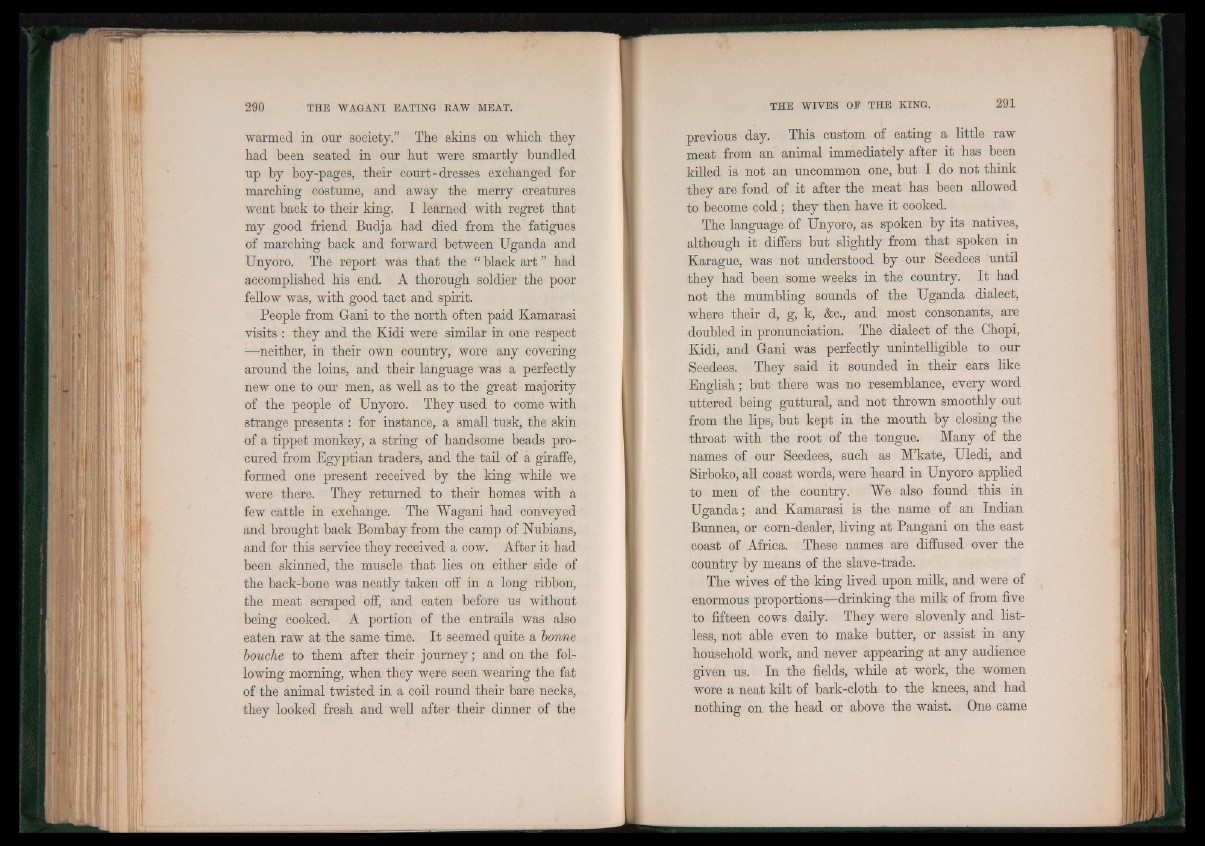
warmed in our society.” The skins on which they
had been seated in our hut were smartly bundled
up by boy-pages, their court-dresses exchanged for
marching costume, and away the merry creatures
went back to their king. I learned with regret that
my good friend Budja had died from the fatigues
of marching back and forward between Uganda and
Unyoro. The report was that the “ black art ” had
accomplished his end. A thorough soldier the poor
fellow was, with good tact and spirit.
People from Gani to the north often paid Kamarasi
visits : they and the Kidi were similar in one respect
—neither, in their own country, wore any covering
around the loins, and their language was a perfectly
new one to our men, as well as to the great majority
of the people of Unyoro. They used to come with
strange presents : for instance, a small tusk, the skin
of a tippet monkey, a string of handsome beads procured
from Egyptian traders, and the tail of a giraffe,
formed one present received by the king while we
were there. They returned to their homes with a
few cattle in exchange. The Wagani had conveyed
and brought back Bombay from the camp of Nubians,
and for this service they received a cow. After it had
been skinned, the muscle that lies on either side of
the back-bone was neatly taken off in a long ribbon,
the meat scraped off, and eaten before us without
being cooked. A portion of the entrails was also
eaten raw at the same time. It seemed quite a bonne
bouche to them after their journey; and on the following
morning, when they were seen wearing the fat
of the animal twisted in a coil round their bare necks,
they looked fresh and well after their dinner of the
previous day. This custom of eating a little raw
meat from an animal immediately after it has been
killed is not an uncommon one, but I do not think
they are fond of it after the meat has been allowed
to become cold; they then have it cooked.
The language of Unyoro, as spoken by its natives,
although it differs but slightly from that spoken in
Karague, was not understood by our Seedees until
they had been some weeks in the country. It had
not the mumbling sounds of the Uganda dialect,
where their d, g, k, &c., and most consonants, are
doubled in pronunciation. The dialect of the Chopi,
Kidi, and Gani was perfectly unintelligible to our
Seedees. They said it sounded in their ears like
English; but there was no resemblance, every word
uttered being guttural, and not thrown smoothly out
from the bps, but kept in the mouth by closing the
throat with the root of the tongue. Many of the
names of our Seedees, such as M’kate, Uledi, and
Sirboko, ab coast words, were heard in Unyoro appbed
to men of the country. We also found this in
Uganda; and Kamarasi is the name of an Indian
Bunnea, or corn-dealer, bving at Pangani on the east
coast of Africa. These names are diffused over the
country by means of the slave-trade.
The wives of the king bved upon milk, and were of
enormous proportions—drinking the milk of from five
to fifteen cows daily. They were slovenly and listless,
not able even to make butter, or assist in any
household work, and never appearing at any audience
given us. In the fields, while at work, the women
wore a neat kilt, of bark-cloth to the knees, and had
nothing on the head or above the waist. One came